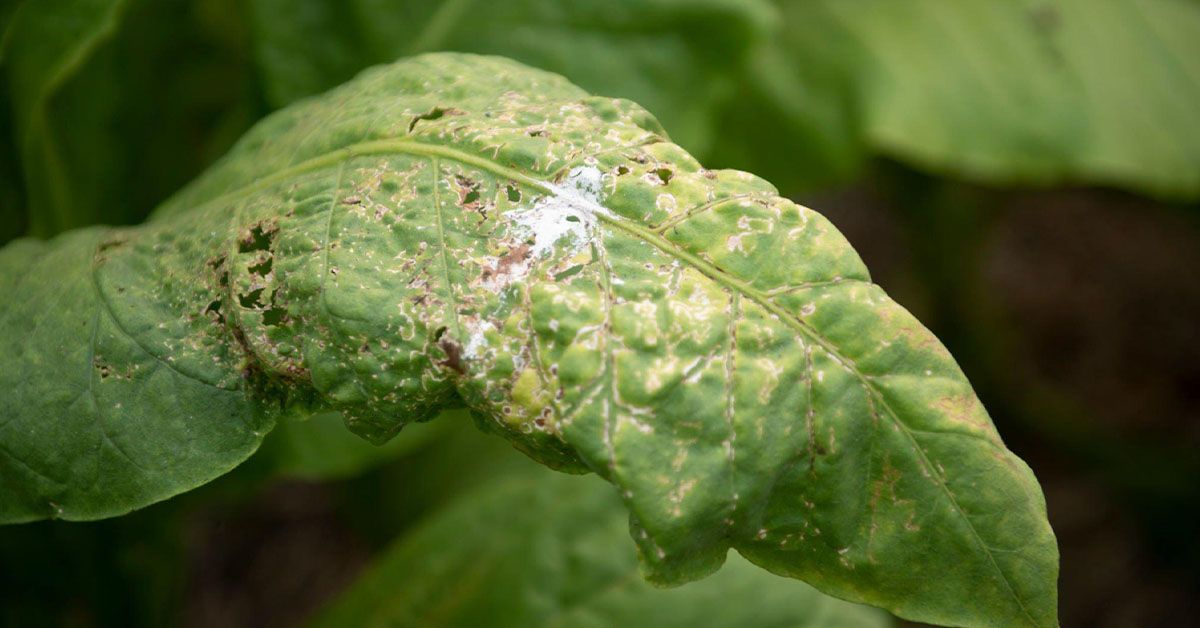Tobacco mosaic virus (TMV) is a plant pathogen that affects a wide range of plant species. It is named after its first discovery in tobacco plants, but it can also infect other economically important crops such as tomatoes, peppers, cucumbers, and potatoes. TMV is one of the most destructive plant viruses, causing significant economic losses to farmers and gardeners worldwide.
Table of Contents
ToggleCommon symptoms of tobacco mosaic virus
TMV symptoms can vary depending on the plant species and the stage of infection. However, there are some common symptoms to look out for. One of the most characteristic signs of TMV infection is the appearance of mosaic patterns on the leaves. These patterns are caused by the discoloration of the leaf tissue, which can range from light green to yellow or white. Other symptoms may include stunting of the plant, curling or distortion of leaves, and necrosis or death of the affected tissue.
Identifying tobacco mosaic virus symptoms in different plant species

While TMV can infect a wide range of plants, the symptoms may differ slightly between species. In tobacco plants, for example, the mosaic patterns on the leaves are usually more pronounced and distinct. In tomato plants, on the other hand, the leaves may exhibit a mottled appearance with irregular patches of discoloration. It is important to familiarize yourself with the specific symptoms of TMV in the plants you are cultivating to ensure early detection and effective management.
Understanding the impact of tobacco mosaic virus on plant health
TMV can have a devastating impact on the health and productivity of infected plants. The virus interferes with the plant’s ability to photosynthesize, leading to reduced growth and yield. In severe cases, TMV can even cause the death of the plant. Furthermore, TMV-infected plants are more susceptible to secondary infections by other pathogens, which can further weaken the plant and exacerbate the damage. It is crucial to take proactive measures to manage and prevent TMV to protect the overall health of your plants.
Managing and preventing tobacco mosaic virus in your garden or farm
Effective management of TMV requires a combination of preventive measures and treatment strategies. One of the most important steps in preventing TMV is to ensure that your plants are free from the virus before planting. This can be done by sourcing disease-free seeds or transplants from reputable suppliers. Additionally, practicing good hygiene in your garden or farm, such as regularly disinfecting tools and equipment, can help reduce the risk of TMV transmission.
Natural and chemical treatments for tobacco mosaic virus
There are various treatment options available for managing TMV, ranging from natural remedies to chemical interventions. Natural treatments include the use of organic fungicides and insecticides that can help control the secondary infections associated with TMV. Additionally, some plant extracts and essential oils have shown promising antiviral properties and can be used as foliar sprays. Chemical treatments, on the other hand, involve the use of synthetic pesticides or antiviral agents that specifically target TMV. It is important to carefully follow the instructions provided by manufacturers when using chemical treatments to ensure their effectiveness and minimize any potential negative impacts on the environment.
Tips for preventing the spread of tobacco mosaic virus

Preventing the spread of TMV is crucial to protect your entire garden or farm from the virus. Here are some tips to help you minimize the risk of transmission:
- Isolate infected plants: As soon as you notice TMV symptoms in a plant, remove it from the healthy ones to prevent further spread of the virus.
- Practice good hygiene: Wash your hands thoroughly after handling TMV-infected plants and disinfect any tools or equipment used. This will help prevent unintentional transmission.
- Control insect vectors: Some insects, such as aphids, can transmit TMV from plant to plant. Implement insect control measures to reduce the population of these vectors and minimize the risk of transmission.
Importance of early detection and diagnosis of tobacco mosaic virus
Early detection and diagnosis of TMV are crucial for effective management and prevention. By identifying the symptoms early on, you can take immediate action to isolate infected plants and implement appropriate treatment strategies. Regular monitoring of your plants and conducting routine inspections will help you identify any potential TMV infections before they spread and cause significant damage.
Case studies: Real-life examples of managing tobacco mosaic virus
Real-life examples of managing TMV can provide valuable insights and practical tips for effectively dealing with the virus. Case studies from farmers and gardeners who have successfully controlled TMV outbreaks in their crops can offer inspiration and guidance. By learning from their experiences, you can adapt their strategies to your own situation and improve your chances of managing TMV effectively.
Frequently Asked Questions
What is Tobacco Mosaic Virus (TMV)?
Tobacco Mosaic Virus (TMV) is a plant virus that primarily affects tobacco plants but can also infect other members of the Solanaceae family, such as tomatoes, peppers, and potatoes. It is known for causing distinctive symptoms in infected plants.
What are the symptoms of TMV infection in plants?
Common symptoms of TMV infection include mosaic-like patterns of light and dark green on the leaves, leaf curling, stunted growth, and yellowing or mottling of the affected plant’s foliage. Infected plants often appear unhealthy and can produce distorted or deformed fruits.
How does TMV spread?
TMV spreads through direct contact, usually via contaminated tools, hands, or clothing during cultivation. It can also be transmitted by insects, like aphids, which feed on infected plants and then transmit the virus to healthy ones.
Can TMV be cured once a plant is infected?
No, there is no cure for TMV once a plant is infected. Infected plants should be removed and destroyed to prevent further spread. Prevention is the best strategy, including proper sanitation and avoiding contact with infected plants.
How can I prevent TMV infection in my plants?
- Practice good hygiene: Wash your hands and disinfect tools and equipment before working with plants.
- Avoid smoking while handling plants: Tobacco products can harbor the virus, so refrain from smoking or using tobacco around your plants.
- Use disease-free seeds and plants: Start with healthy, disease-free materials to reduce the risk of infection.
- Control insect vectors: Manage insect pests, like aphids, which can transmit TMV.
- Isolate infected plants: If you notice TMV symptoms, isolate the infected plant immediately to prevent spread to others.
Can TMV affect human health?
TMV is specific to plants and does not infect humans, animals, or food crops that we consume directly. However, tobacco workers who handle infected plants are at risk, so proper precautions should be taken in agricultural settings.
Can I eat fruits from a plant infected with TMV?
It is not advisable to consume fruits from infected plants, as the virus can cause distortions and affect the plant’s overall health. Additionally, the virus particles could potentially persist on the fruit’s surface.
Are there resistant plant varieties available?
Yes, some plant varieties have been bred to be resistant to TMV. Using resistant varieties is an effective way to reduce the risk of infection. Check with local nurseries or agricultural extension services for suitable varieties for your region.
Is TMV a common problem in gardening and agriculture?
Yes, TMV can be a common problem in areas where tobacco or related crops are grown. However, with proper preventive measures and good agricultural practices, the risk of TMV infection can be significantly reduced.
Can I compost infected plant material?
It is not recommended to compost plant material from TMV-infected plants, as the virus can persist in the compost and potentially infect other plants. Dispose of infected plant material in a way that ensures it will not spread the virus, such as burning or landfill disposal.
Conclusion: The importance of proactive management and care for plant health
In conclusion, understanding tobacco mosaic virus symptoms is essential for identifying and managing the health of your plants. By familiarizing yourself with the common symptoms and adopting proactive measures, such as preventive practices and early detection, you can minimize the impact of TMV on your crops. Remember to practice good hygiene, implement appropriate treatments, and seek advice from experts or agricultural extension services if needed. By prioritizing the health of your plants, you can maximize their productivity and ensure the long-term success of your garden or farm.


